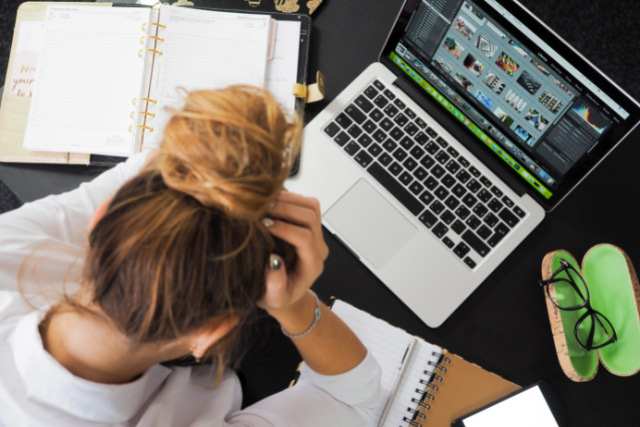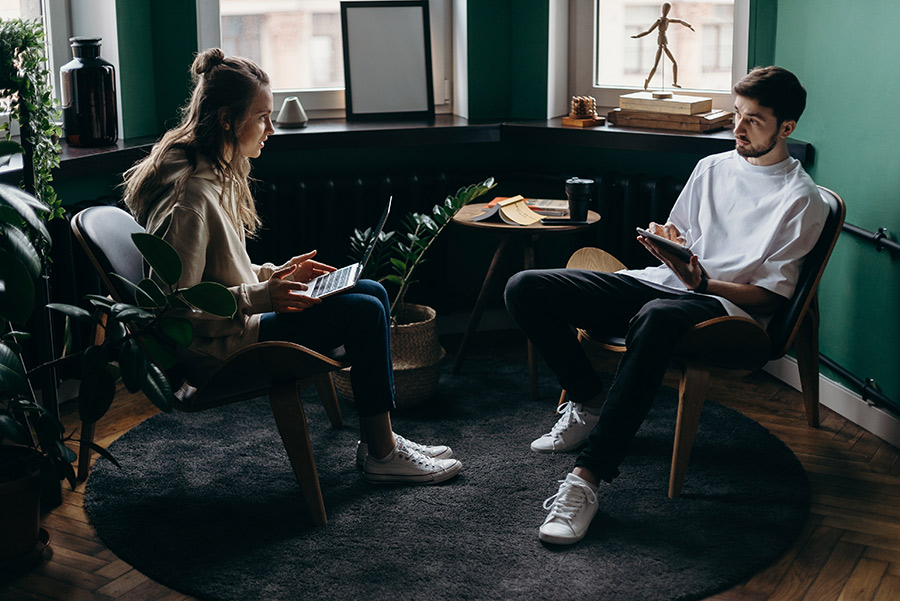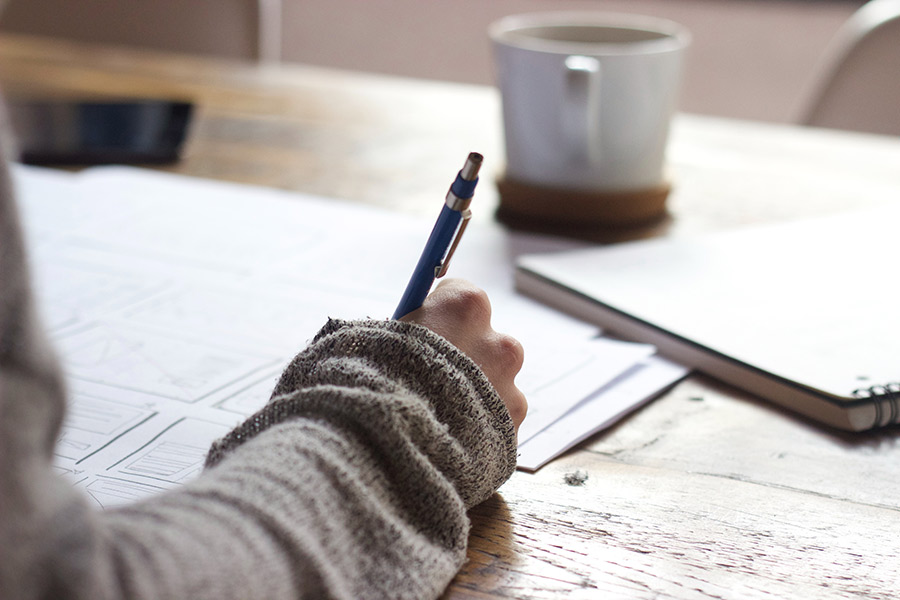How to Be Productive When Studying: 10 Hacks and Tips

Returning to education can be daunting, but it also be an incredibly rewarding experience. In this blog article, we will talk about productivity and give you some guidelines that you can follow to set yourself up for success as you embark on the exciting journey of higher education.
Looking for something specific? Jump to section:
- Why are Productive Hours Important for Students?
- Increase Productivity While Studying: 10 Tips to Help You Study
- Beware of Toxic Productivity
Why are Productive Hours Important for Students?
One of the first things that you should consider as a student is when are you most productive? Some people prefer getting things done in the morning, some prefer burning the midnight oil. Regardless of which category you fall into, it’s important to give this some thought and plan your study accordingly.
Another important aspect to consider is when can you be productive? Are you restricted by work or other activities? A useful way of acknowledging where your time is going is by doing an inventory of your time. You can do this with the use of an hourly weekly schedule. Create your own or download templates from Microsoft Excel or Word.
Once you have your template, fill it out with existing commitments, appointments and important dates (personal and college related). Once that’s done, you’ll have a pretty good idea of where you have capacity for studying, whether that is for a few hours in the morning or in the evenings. Having dedicated study time is essential as this will help you focus on your study tasks; over time, this will become a routine.
Increase Productivity While Studying: 10 Tips to Help You Study
1. Set Specific Goals and Stick to a Plan
Having a clear overall plan is something important that you can do to aid you in achieving your goals. Setting short, achievable goals for yourself along the way will help to keep you on track.
A simple way of setting attainable goals is by following the SMART guideline and making sure that goals are Specific, Measurable, Achievable, Relevant and Time-based. By setting goals with these aspects in mind, you are setting yourself up for a positive outcome.
2. Identify Your Learning Style
Figuring out the way you learn best is something that will help you throughout your academic life. Over the years, researchers and psychologists have tried to understand how we learn, and many models of learning have emerged over the years. A popular one is the VARK model, where VARK represents four main learning styles: Visual, Auditory, Reading/Writing and Kinaesthetic.
This model proposes that if you are a visual learner, you may benefit from learning through visual representation such as diagrams, charts and the use of colour in your notes. Auditory learners can learn best through listening or presenting information verbally. Reading/Writing learners will learn by writing notes and re-reading study material. Lastly, Kinaesthetic learners learn best by using all their senses, but learn best by moving around.
Of course, we don’t learn in any one particular way, rather, we learn through a combination of different styles and methods. If you are returning to education, it’s important to keep in mind that your learning style may have changed over the years and what worked for you in school may no longer be suitable.
3. Use the Buddy System
Depending on the programme content and circumstances, studying on your own can be productive; however there are times when studying in a group can be even more productive.
Studying in a group or with a partner can make the experience more enjoyable. It can also expose you to different perspectives and outlooks therefore providing an enriching experience. Aside from it being more enjoyable, it can also be helpful in revealing knowledge gaps or gaps in your understanding.

For example, when explaining a concept to your partner, or members of your study group, you might realise that you get stuck while explaining a particular step of a process, therefore providing more insight to your knowledge gaps.
For group study to be successful, it is important to abide by some rules:
- Plan a group study session after you have initially studied the relevant material
- Decide and plan the topic/s that will be discussed during the study session
- Pick a venue where there are minimal distractions, and you won’t distract those around you
- Be mindful of the group size; if the group is too big, it will be difficult to give everyone a fair chance – aim for no more than 4/5 group members
4. Take Breaks
Our attention span is between 45 to 60 minutes so continuous studying is not as productive as you may think. Taking a break will help you prevent study fatigue and allow you to return to your notes with fresh focus. However, be mindful of the duration of your breaks – leave them too long and you’ll lose motivation to return to your studies.
Try using the Pomodoro Technique where you balance study and breaks. Set a timer for 25 minutes and completely focus on your task. When the time is up, put a checkmark on a piece of paper and take a short 3-to-5-minute break. You’ve just completed one Pomodoro! When you’ve completed four Pomodoros, you can take a longer break i.e. 15/30 minutes.
During your breaks, try to do something relaxing like going for a short walk, listening to music or doing some meditation. This method allows you to increase productivity by taking short breaks, which prevents you from getting fatigued. Feel free to experiment with the length of the focus periods, it’s important to adapt these to your learning as needed.
5. Reward Yourself
In order to be productive and study efficiently, it is important to reward yourself for your hard work. This can help to keep you motivated and will also reinforce the behaviour.
Some ways that you can reward yourself: give yourself the evening off once you have achieved your study goals; reward a study session with a half hour of your favourite show or game; you can take a nap, or meet up with a friend, whatever makes you happy.
This is similar to the Pomodoro Technique we mentioned in point 4 – except this is on a larger scale. You complete your study, you get a reward!
6. Tackle the Most Difficult Areas When You’re Most Alert
A popular productivity and time management method used by many around the world, is the “Eat the Frog” technique. The idea with this technique is that eating a frog represents completing the most challenging task of the day and is a straightforward way of increasing productivity.
This is how it works – first, choose a “frog” (difficult task) for the day. This is the task that you will need to accomplish for the day. You should try to get your task completed early in the day and out of the way, hence the phrase “eating the frog”. For example, you have an assignment with an approaching deadline, but you’re not sure how to start. Your “frog” might be making a plan for your assignment or reaching out to the lecturer to get clarification. So by “eating the frog” or getting started on your assignment, you are helping yourself be more productive.
By completing the most difficult tasks of the day first thing in the morning, you are putting a stop to procrastination. When a task is difficult and we don’t really know how to get it started, we tend to put it off, or procrastinate. By practising the “Eat the Frog” technique consistently, it will become part of your routine.
7. Stop Multitasking
Most of us buy into the idea that we can multitask effectively, but in reality, we cannot focus on multiple tasks at the same time. What usually happens when we think we are multitasking is that our focus moves from task to task. As a result of this, the task we are trying to complete takes longer, and we are more likely to make mistakes.
Instead of multitasking, try to focus on single tasks at a time. Whereas you might spend an hour studying with the TV on, perhaps focus only on your studying for 45 minutes and this will allow you to watch TV for 15 minutes – and the TV can be a nice reward for your studying efforts! The Pomodoro Technique, discussed earlier, can be a great tool for discouraging multitasking as it encourages periods of focus followed by short breaks. This can help enhance productivity in general.
8. Limit Distractions
When we talk about productivity, it is important to acknowledge that there are some unavoidable distractions that students face. No matter how organised we are, things will seldom go to plan because as humans we are prone to distractions.
However, there are certain things that we can do to limit distractions and therefore enhance our productivity. Firstly, it’s important to minimise the use of devices when trying to study or be productive. We are conditioned to check notifications once we are aware of them, so that means that if we receive a message and we decide not to check it, it will hold our attention in the back of our minds.
It is best to keep devices out of sight and out of mind. Be also wary of smart watches; if they are connected to your phone, they will alert you of notifications and therefore break your focus and productivity.
9. Create a Productive Study Environment
Your study environment can have a great impact on your productivity as well as the quality of your study. In order to have an effective study environment, it’s important to keep the following aspects in mind:
- Dedicated Study Space – Having a dedicated space where you can complete college related activities or study can improve concentration. This doesn’t have to be an elaborate space. However you may find that having a dedicated space for study, where you have everything you need before you start, increases productivity levels.
- Light – Having an appropriate level of light is important to avoid eye strain and fatigue. If you are spending time in the evenings in front of a screen, consider using the blue light filter option on your laptop/desktop. This can help limit eye strain and headaches.
- Ergonomics – If you watch lectures in bed or on the couch with the laptop on your knees, over time you will have pain and stiffness in your body. This will distract you from your tasks and make it difficult to be productive. Having an ergonomic study space will help you learn more efficiently.
- Distractions – If you are living with other people, let them know when you have online classes or when you are studying. Ask them to be mindful of distractions and noise so that you can focus on your tasks. Putting your phone away and closing those extra tabs on your browser will also help you gain more focus. If you live in a particularly noisy household, you could try using noise-cancelling headphones to minimise noise and distractions.
- Supplies – Before you sit down for an online class or a study session, think about the things you will need. Do you have a notepad and pen, a drink, or a snack? Gathering the things you will need, in advance, will reduce the need for you to break your concentration.
10. Get Enough Sleep
Getting a good night’s rest is essential for our brain to process information. Around eight hours of good quality sleep per night is essential for optimum brain performance but everyone is different, and the amount of sleep needed will depend on a variety of factors such as gender, age, genetics, etc.
Developing good sleeping habits can help students be more productive by enhancing focus and allowing the body and brain to be alert. There are certain things that we can do to help develop good sleeping habits, such as:
- Going to bed early and keeping bedtime consistent even at the weekends
- Avoid going on digital devices right before going to sleep. The light on our devices contains blue light which stops the release of the hormone melatonin in our bodies which helps us sleep
- Keep naps shorter than an hour and avoid napping after 4pm
- Avoid caffeine outside of the morning time as it remains in the body for hours. Also be mindful that caffeine can be found in things other than coffee, for example black tea
- Avoid having big meals after 7pm as digestion can affect quality of sleep
Beware of Toxic Productivity
Productivity is a great thing, it helps us achieve things in our day to day lives and it gives us a sense of satisfaction and achievement. Every time we tick an item off our to-do list, we get a dose of happy hormones from our brain as a little reward. So, being productive can be fun.
However, beware of toxic productivity. This is where productivity and busy-ness take over, which can lead to feeling overwhelmed and frustrated. It can be dangerous to try and be productive all the time as this can lead to burnout and a variety of other issues. It can be helpful to check in with yourself every now and then, to ensure that you are keeping on track and not overdoing things.
Prioritisation of tasks is important and creating a to-do list for the week, or for the day, and prioritising the important tasks can keep you on track with productivity.

Studying at third level, or at any level, can have its ups and downs. It’s important to acknowledge that you will have productive and less productive days. Remind yourself of the reasons why you signed up for the programme and reward yourself with praise when you complete challenging tasks.
Keep the tips in this article in mind and try to enjoy the experience as much as you can. And don’t forget that there is a network of support available for you as a learner at Innopharma Education.
If you’d like more information or resources, get in touch with our Learner Support Coordinator at learnersupport@innopharmalabs.com.



















